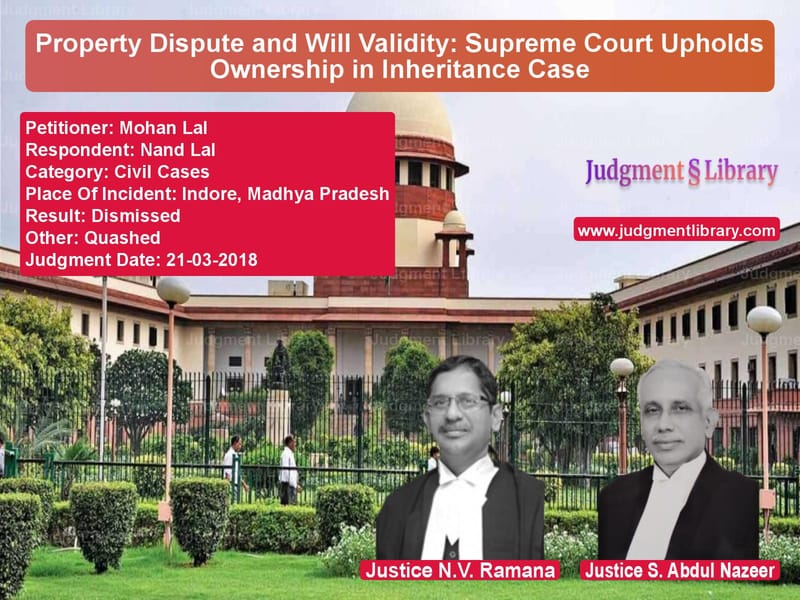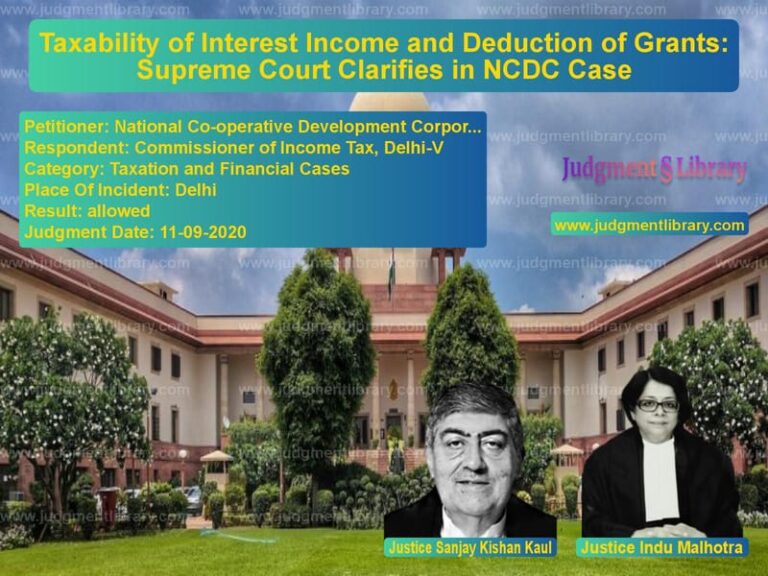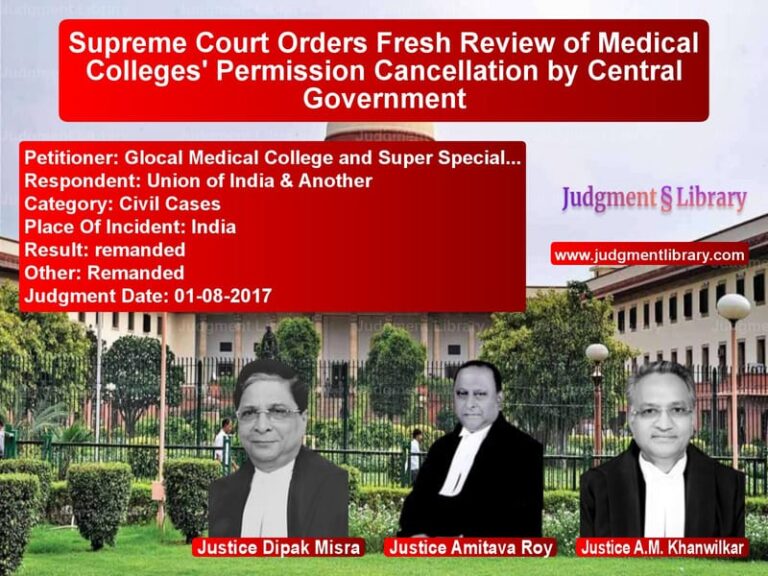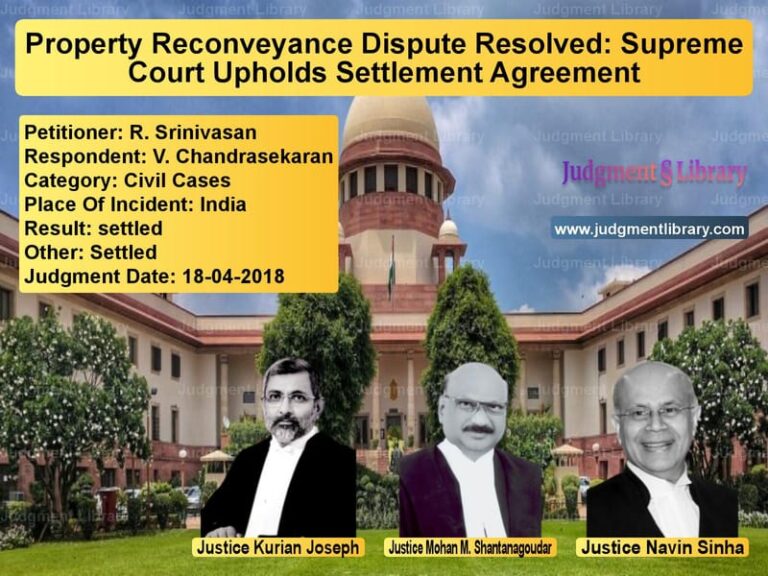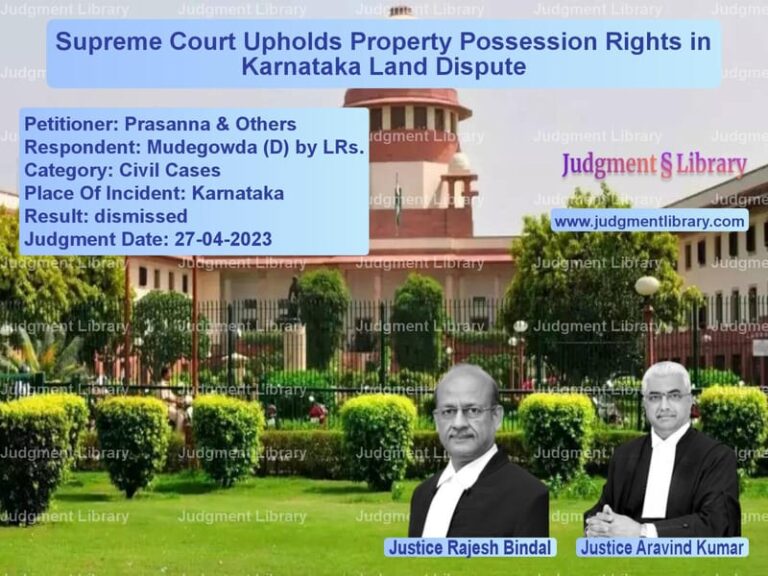Property Dispute and Will Validity: Supreme Court Upholds Ownership in Inheritance Case
The case of Mohan Lal v. Nand Lal is a landmark judgment concerning property inheritance, the validity of a will, and the rights of legal heirs. The Supreme Court upheld the decisions of the trial court and the Madhya Pradesh High Court, affirming the plaintiff’s ownership based on a will executed in 1945. The Court dismissed the appeal, rejecting the appellant’s claim to half the share in the disputed property.
Background of the Case
The legal dispute began in 1989 when the respondent, Nand Lal, filed a suit before the District Judge, Indore, seeking the ejectment of his brother, the appellant, Mohan Lal, from the suit property and claiming mesne profits. The appellant contested the suit, arguing that he was entitled to half of the disputed property as it originally belonged to their late maternal grandfather, Goverdhanlal. He claimed that upon the death of his grandfather, his mother inherited a share in the property, and he had been living there with her.
The respondent, however, later amended the plaint, presenting a will executed by Goverdhanlal on September 9, 1945, in his favor. He asserted that he became the sole owner of the suit property after their grandfather’s death in 1947. The trial court ruled in favor of Nand Lal, decreeing the suit in his favor. Dissatisfied with the ruling, the appellant approached the High Court, which upheld the trial court’s decision. Subsequently, he filed an appeal before the Supreme Court.
Petitioner’s Argument
The appellant, Mohan Lal, argued that:
- He was entitled to half the share in the property as a grandson of late Goverdhanlal.
- His name had been mutated in the municipal records, reinforcing his claim to ownership.
- The will in question was introduced as evidence only after he had filed his written statement, making it an afterthought.
- The will was not executed in accordance with the provisions of Sections 61 and 63 of the Indian Succession Act, and therefore, it could not be considered a valid document.
- His grandfather had two surviving daughters, including his mother, and after the death of his aunt, her daughters also acquired rights to the disputed property.
- The trial court had erred in failing to include all necessary parties in the suit, such as the legal heirs of his aunt.
Respondent’s Argument
The respondent, Nand Lal, countered that:
- The will was executed by their grandfather in 1945, when he was the only male child in the family.
- The will was handwritten by Goverdhanlal, who was an advocate by profession.
- At the time of their grandfather’s death in 1947, the respondent was 13 years old, while the appellant was born eight years later.
- As a younger brother, the appellant was permitted to live in the disputed property, but he had promised to vacate the house when required.
- The appellant later dishonestly got his name mutated in municipal records without any legal backing.
- The trial court and High Court correctly assessed the will’s validity, and the appellant’s claims were baseless.
Supreme Court’s Observations
The Supreme Court carefully analyzed the validity of the will and the appellant’s claims. The key observations included:
1. Validity of the Will
The Court found that the will had been executed in 1945 in the testator’s own handwriting. A key witness, PW5—Nandlal Nagar, grandson-in-law of the testator, testified that he was well-acquainted with the testator’s handwriting. The Supreme Court observed:
“Going by the material on record, we do not find any suspicious circumstance surrounding the genuineness of the Will.”
2. Appellant’s Name in Municipal Records
The Court ruled that the mere mutation of the appellant’s name in municipal records did not grant him ownership rights, stating:
“The addition of the appellant’s name in the municipal records does not, by itself, confer any ownership rights, especially in the absence of any supporting legal evidence.”
3. Previous Pledge of the Will
The Court noted that the will had been pledged with Indore Paraspar Sahkari Bank as collateral for a loan taken by the respondent in 1964. The bank’s records confirmed that the document had been in its possession since then. The Court observed:
“The will was not brought in as an afterthought; rather, it was in the bank’s custody for decades, further proving its authenticity.”
4. Non-Inclusion of Necessary Parties
The Supreme Court dismissed the appellant’s claim that the suit was defective due to non-inclusion of his aunt’s heirs, stating:
“Once the will is established as a genuine and valid document, the issue of inheritance under general succession laws becomes irrelevant.”
5. Concurrent Findings of Lower Courts
The Court emphasized that both the trial court and the High Court had thoroughly examined all the evidence and arrived at a well-reasoned conclusion. It ruled:
“In the absence of any cogent reason to interfere with the concurrent findings of the courts below, we find no merit in the present appeal.”
Supreme Court’s Final Verdict
The Supreme Court ruled as follows:
- The appeal was dismissed with no order as to costs.
- The will dated September 9, 1945, was found to be genuine and valid.
- The respondent, Nand Lal, was the rightful owner of the disputed property.
- The appellant, Mohan Lal, had no legal claim to half the property.
Key Takeaways
- The Supreme Court upheld the validity of the 1945 will, confirming the respondent’s ownership.
- The Court ruled that mutation in municipal records does not create ownership rights.
- The will had been in the custody of a bank since 1964, proving its authenticity.
- The Court reaffirmed that concurrent findings of lower courts should not be interfered with unless there is a substantial legal error.
Conclusion
The Supreme Court’s decision in this case provides clarity on inheritance disputes, the validity of wills, and the impact of municipal record mutations. By dismissing the appeal, the Court reinforced that rightful ownership must be established based on legal evidence rather than mere claims of possession.
This ruling serves as an important precedent in property law, ensuring that inheritance rights are determined based on legally recognized wills and preventing wrongful claims based on mere occupancy or municipal records.
Petitioner Name: Mohan LalRespondent Name: Nand LalJudgment By: Justice N.V. Ramana, Justice S. Abdul NazeerPlace Of Incident: Indore, Madhya PradeshJudgment Date: 21-03-2018
Don’t miss out on the full details! Download the complete judgment in PDF format below and gain valuable insights instantly!
Download Judgment: Mohan Lal vs Nand Lal Supreme Court of India Judgment Dated 21-03-2018.pdf
Direct Downlaod Judgment: Direct downlaod this Judgment
See all petitions in Property Disputes
See all petitions in Succession and Wills
See all petitions in Landlord-Tenant Disputes
See all petitions in Judgment by N.V. Ramana
See all petitions in Judgment by S. Abdul Nazeer
See all petitions in dismissed
See all petitions in Quashed
See all petitions in supreme court of India judgments March 2018
See all petitions in 2018 judgments
See all posts in Civil Cases Category
See all allowed petitions in Civil Cases Category
See all Dismissed petitions in Civil Cases Category
See all partially allowed petitions in Civil Cases Category

